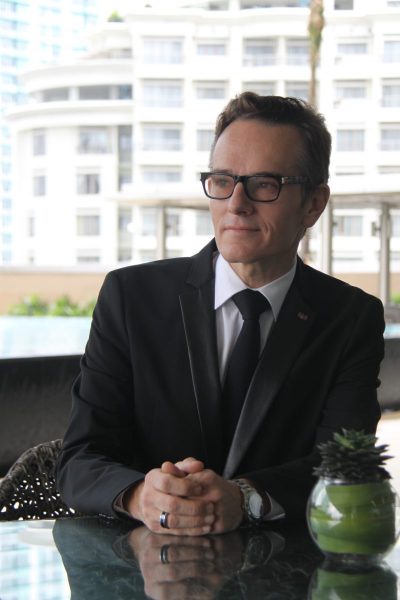Patrick shares with us his experience from France to Indonesia, and what it’s like managing five properties across three brands (Ascott, Somerset and Citadines) in Jakarta.
Patrick, tell us a little about your background and how you came to be in Indonesia.
My background is in hospitality. I studied in Paris and have worked for both the Hyatt and Accor groups. I moved from hotels to serviced residences because I feel you can be closer to the guests in this environment. I’ve now been with Ascott for over ten years. Previously I was Area Manager of 11 properties in the South of France before the opportunity came up in Indonesia in October 2014.
As a group, Ascott founded the concept of international-class serviced residences in Asia, by opening the Ascott Singapore in 1984. How has Ascott distinguished itself from new competition since then, to retain its pioneering position?
We offer tailored ‘extras’ for our guests based on property location, clientele and context. Along with regular sports and children’s activities, we offer Bahasa Indonesia classes (including going out into the markets for practice); Chinese New Year celebrations, and even Russian New Year parties in some properties. It’s about finding the peripheral extras that make the guests feel welcomed, special, and at home.
At the World Travel Awards in 2014, you won Leading Serviced Apartment Brand in eight countries, including Indonesia (where Ascott Jakarta also won Leading Serviced Apartment). What do you think contributed to these achievements?
The group’s approach is strongly customer-centric – you cannot achieve anything without your customers, it is like trying to run a car without gasoline! We have formal feedback mechanisms, but we also spend time talking and listening to our customers and sharing learnings back to the team, so they can try to pre-empt guests’ behaviours and habits, making their stay even more comfortable.
What groups make up your customer base in Jakarta?
The majority of our customers are expats, but we also have Indonesian guests, perhaps working in Jakarta temporarily. Around 10-15% come from Europe, and the rest are Chinese, Japanese, Malaysian, Singaporean, Indian, or American. 50% of our customers come here with families—usually they are from places that are further away, like Europe—and of the remaining 50%, half are single, whereas half travel back to see their families at the weekend.
If many of your customers are international businesspeople here for a short time, what impact do you think Indonesian government regulations on foreigners doing business here will have for you?
I don’t think there is anything looming which will significantly deter expats or have a large impact on our business. I also think the possibility of a language test for workers wanting to come here is fair enough. You must respect and adapt to the culture you are joining – something I try to bring into my own work.
What’s a typical day’s work like for you – if it exists?
My morning ritual is reading the French and Indonesian press with a green tea – in France it is hard to find green tea! Then I watch local TV, to help with my Bahasa Indonesia. At the office, I make a point of greeting everyone; it’s important. I catch up on emails and meet with my team. In the afternoons I might focus on one of our development projects; maybe a new restaurant in one of the properties – or even a brand new site. Each evening I like to try a new Indonesian delicacy, if I can!
Last year Ascott secured one of its first franchise agreements in Asia to open Citadines Kuta Beach Bali. Is franchising the way forward for Ascott in Indonesia, and if so, why?
Yes, this is one of the ways we will continue to grow our business. Franchising works because we have a reputation as a transparent, trustworthy company – there is a certain savoir faire we can bring to the table. Other ways we expand are via management contracts, and owner-management.
You were previously Area Manager for Ascott in France. What did you find to be the major differences on transferring to Indonesia?
Before coming I read up on Indonesian culture, but there is still much to learn. I found I needed to take time to listen and understand people so I could adapt my approach accordingly – for both colleagues and clients, who are sometimes of nationalities I have not worked with before. Otherwise, just the usual – the traffic, and the sticky tropical weather!
Does Ascott have plans for further expansion in Indonesia? If so, where do you see growth and why?
Two projects coming up in 2015 are the Ascott Surabaya, and the Somerset Pondok Indah. I can’t divulge any projects still in the confidential stages, but we are open to opportunities to grow in Indonesia, for example in regional cities outside of Jakarta, where we have been approached by customers to consider opening.
How do you motivate staff, and have you found this to be different in Indonesia than in France?
We offer a lot of training for all levels, from basic English and IT courses, to cross-department exchanges, to the chance to get involved in green initiatives. For high performers, the opportunities are the same worldwide whether you work in Indonesia or France.
Tell us a funny story that has happened to you in one of your hotels.
Once, in Cannes, we had a guest that looked just like a famous French actor, Jean Dujardin. All the staff were wondering if it was really him. When the guest checked out the next morning, we didn’t know there were a couple of photographers waiting outside! He was very understanding, as it wasn’t the first time. He came back inside and offered to sign a few ‘autographs’. Then he said he had his fifteen minutes of fame and went on his way. The funny thing is, it was April Fools’ Day!
Thanks Patrick! To get in touch, email: [email protected]






